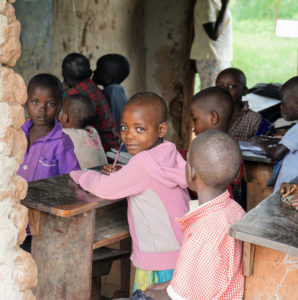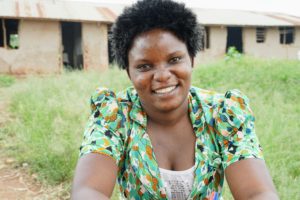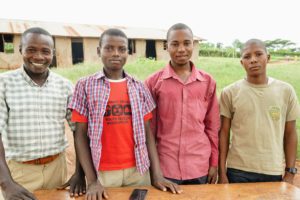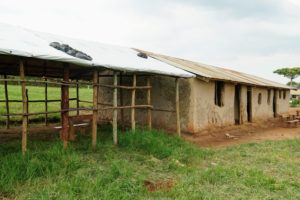
Through our Thriving Schools Program, Building Tomorrow is harnessing Community Education Volunteers to help Congolese refugees in Western Uganda access the infrastructural and human resources they need to succeed.
Spread across the hills of Western Uganda in Kamwenge District is the Rwamwanja Refugee Settlement. Home to more than 76,000 refugees, most of the settlement’s residents are Congolese nationals who fled the M23 rebellion in 2012 and the broader ongoing Kivu conflict.[1]
While the settlement is at full capacity and no longer accepting new arrivals, it nonetheless still struggles to provide quality education to those who live within its confines, and the community still scrambles to access existing educational resources. On an infrastructural level, just over a third of the 210 required permanent classroom structures have been constructed.[2] And on an economic level, refugee families with limited livelihood opportunities often fail to stretch their income to be able to afford school fees and other educational costs, such as uniforms and scholastic materials.
As a consequence, many Congolese children are not enrolled in school and find themselves unable to benefit from the knowledge and skills that could help them integrate with their Ugandan hosts and empower themselves economically.
Halerimana Apollinaire and Clementina Mutoni, two Building Tomorrow Community Education Volunteers (CEVs) and teachers serving the Rwamwanja Refugee Settlement at Mahani Primary School, are trying to turn this reality around.
Together with Building Tomorrow Fellow Lucky Natakunda, they are reaching out to the surrounding community to get out-of-school children back to class and back on track for receiving the quality education they deserve.
“My work is to show them that their studies are more important than all other things and that they must not stay at home,” says Halerimana. “They must go back to school.”
The task is not an easy one, but because both CEVs are natives of the Democratic Republic of the Congo (DRC), they are able to understand the challenges and connect with the surrounding community in ways that others might not be able to, both linguistically and emotionally.

Community Education Volunteer Clementina Mutoni sits in front of Mahani Primary School.
The CEVs explain that there is a mindset from home, for example, that a settlement camp is a place just “for that—settling—with all other activities beyond basic necessity taking a back seat.
“But they must study,” says Halerimana, “because there are many activities they can achieve there, and it can help in their life.”
Through dialogue, persistence, and patience, the CEVs are able to convince many parents to support their children in their studies. As evidence for the success of these efforts, Halerimana and Clementina have already been able to enrol 250 previously out-of-school Congolese children at Mahani Primary School.
For others, however, economic realities and distance are unable to be overcome.
“There is a lack of money for paying school fees, providing clothes, buying scholastic materials, and having enough to eat during the school hours,” explains Clementina. Therefore, not all children are able to be brought back to school.
“My work is to show them that their studies are more important than all other things.”
However, a simple dialogue with the parents over time is often enough to convince at least some families of the exigency and importance of education, and the CEVs continue to enrol more Congolese children at Mahani Primary School each term.
“We continue to sensitize them,” says Halerimana. “This is a government school, but Building Tomorrow came to this school and said we should share information in our communities to get children back to school, and that is my work here at Mahani Primary School.”
The work does not end there though. Once the children are enrolled at Mahani Primary School, there is still the challenge of retaining them there and preventing them from dropping out again. Over half of the school—a total of 817 children out of 1,312 children—are Congolese nationals, and with that comes special challenges for learning, especially linguistically.
Children from the DRC are taught in French and Kiswahili, while the Ugandan system allows instruction in local languages at the lower levels and prescribes instruction in English at the upper levels of primary school. Those who are unfamiliar with the local language—in this case Runyankole—or English therefore fail to understand the medium of instruction in Uganda and often struggle in school.
The CEVs, however, also serve as teachers at Mahani Primary School, and because they are fluent in both Kiswahili and French, are a critical resource for linking the Congolese students to the content of their lessons.
“My job is to help translate the lessons for the Congolese, whether it’s into Kiswahili or French, so that they can understand,” says Clementina, who serves as a teaching assistant in mathematics at the P1 and P5 class levels.
Such translation services are especially needed for the older students who comprise the bulk of the children that Clementina has brought back to school. “For those who arrive when they are younger, it’s easier to adapt to the language,” explains Clementina. For older students, however, the educational system can prove extremely frustrating and even cause students to view school as not worthwhile.

From left to right: Halerimana Apollinaire (CEV), Benjamin (student), Anthony Amutuhaire (English teacher), and Eritier (student)
Benjamin and Eritier are two Congolese students at Mahani Primary School who were enrolled through the efforts of Clementina Mutoni and benefit from the multilingualism of the CEVs at school.
Benjamin, who is in his final year of primary school, fled to Uganda in January 2018 with other members of his community to escape the war in North Kivu. Clementina found him at his home in Rwamwanja Settlement Camp and urged his parents to allow him back in school to gain some knowledge and help secure his future. They were not easily convinced of the merits of Benjamin receiving an education, and it took many visits from the CEV to convince them otherwise. However, her message finally broke through and Benjamin enrolled at Mahani Primary School in February 2018.
Eritier, who is also in his final year of primary school, came to Uganda in May 2017 to escape the violence around his home in North Kivu. Like Benjamin, he started school at Mahani Primary School in February 2018 and also has Clementina to thank for convincing his parents, who are neighbors of Benjamin’s family, to allow him back in school.
Echoing Clementina’s description of the challenges that the Congolese students face at Mahani Primary School, both boys say that they are up against significant obstacles in their educational experiences, especially with respect to overcoming the language barrier. However, both boys see the challenge as an opportunity and cite English as their favorite subject in school
“My favorite subject in school is English because if I can learn English, I can understand my other courses,” Eritier explains. He sees it as a tool for the rest of his learning and important for realizing his dream of becoming a doctor one day and helping many different kinds of people.
Benjamin, similarly, sees English as a tool for connecting to other people and information, a link to the rest of the world. “If you don’t know English well, you cannot communicate with people from other countries,” he says. With a passion for education, Benjamin knows that improving communication will be important for making his dream of becoming a teacher in Uganda or even the DRC, if he can return, a reality.
Halerimana and Clementina continue to serve as valuable resources to both boys as they navigate their way through their classes.
However, while the efforts of such CEVs continue to link refugees with learning at Mahani Primary School, major infrastructural investments still need to be made at Rwamwanja Refugee Settlement to meet the demand for quality education amongst the population.

Educational infrastructure has trouble keeping pace with demand in Rwamwanja Refugee Settlement, resulting in the use of two semi-permanent structures at Mahani Primary School to accommodate more students.
Both Halerimana and Clementina cited distance as the biggest inhibitor of children accessing primary education, and research into the settlement’s educational gaps supports this perspective.[3]
To help fill the settlement’s infrastructural gaps in education, Building Tomorrow has therefore proposed the construction of a primary school at Kinyonza, with groundbreaking expected to take place in September 2018.
In the meantime, Building Tomorrow Fellows and CEVs continue to serve as critical allies on the frontlines of the fight for access to quality education in Kamwenge District and in galvanizing community support for the creation of thriving schools each and every day.
The recruitment and enrolment of out-of-school children through Fellows and CEVs is a core pillar of Building Tomorrow’s Thriving Schools Program. In partnership with Educate A Child, the Thriving Schools Program has brought more than 23,000 children back to school in Uganda.
To find out more about how we are working hand-in-hand with local stakeholders to bring quality education to underserved children in East Africa, click here.
[1] UNHCR, “UNHCR Rwamwanja Fact Sheet.”
[2] UNHCR, “Uganda Refugee Response Monitoring Settlement Fact Sheet: Rwamwanja.”
[3] UNHCR, “Uganda Refugee Response Monitoring Settlement Fact Sheet: Rwamwanja.”

Follow Us on Social Media